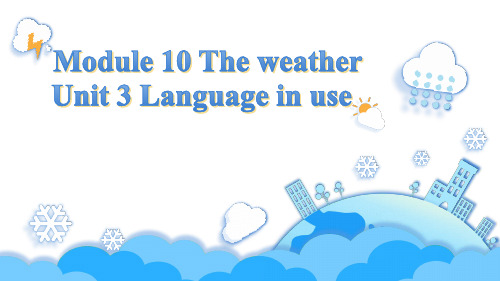新外研版m10u3
- 格式:ppt
- 大小:5.19 MB
- 文档页数:40










Module 10 On the radio Unit 3 Language in use
1. 掌握并正确使用宾语从句的时态和语序。
2. 能够根据所给的提示描述校园广播。
1. 掌握并正确使用宾语从句的时态和语序。
2. 能够根据所给的提示描述校园广播。
1. Remember all the new words and useful expressions of this module.
2. Try to write down something about your school broadcasting.
根据新课标的要求, 结合教材和学生特点, 主要采用任务型互动式方式进行教学, 结合情景法、交际法、听说法、归纳法等教学方法实施课堂活动,开启学生思维, 通过一系列有条理的教学活动, 引导学生自主探究学习和与他人互动合作学习, 让学生体验学习的快乐。

八年级英语教学设计课题M 10 U 3 Language in use. 课型复习课序号学科素养语言能力,思维品质,文化品格,学习能力课标分析学段目标:1.能准确朗读目标词汇;能使用正确的语音语调朗读关于天气的表达;2.能知道目标词汇和目标句型的基本含义和用法;3.能读懂文章并找出有关信息,理解大意;4.能用may/might表达天气的可能变化,并理解并说出含有because,so, but等说明游览某地理由的句子。
模块目标(依据英语学科素养):教材分析学情分析知识经验:已知:1.学生通过之前的英语学习和本模块第一单元的学习,掌握了基本的地理位置和天气的表达,为本节课的阅读理解奠定了一定的基础。
未知:1.本模块美国的城市学生学过New York, California,但是对其他几个城市的单词并不认识,增加了畏难情绪。
(难点)2.个性化差异:学生通过之前的英语学习和本模块第一单元的学习,有的同学may/might表可能的用法已经部分掌握。
策略经验:通过迁移策略,理解课文。
通过自学和互帮策略理解课文。
学生能够利用小组合作学习策略,交流学习心得,表达各自观点。
利用各种资源,采用自主学习策略,进行预习和自学。
生活经验:只有个别学生比较了解美国的城市地理和天气情况,对大部分学生来说,本节课的内容比较陌生。
学习目标(学习活动+学习主体+(行为程度)+评价活动)1.根据提示词,85%的学生能够写出相对应的单词和词组,句型能基本写正确,15%的学生在其他同学的帮助下能够写出单词和词组,能听懂其他同学表达的句子。
2.85%的学生通过语法点的整理与练习,能够用过去进行时和表过去的时间状语连用形成的复合句并仿照造句。
其他同学能够理解。
3.通过泛读、精读等活动,读懂关于交通规则和意外事故的文章。
重难点及突破措施重点:询问天气及温度句型表述。
难点:表示天气的名词及形容词之间的转换以及表示推测的情态动词用法。
突破措施:采用教师辅导学生回顾、总结和归纳的方式,强化单词和句型的理解记忆,提高学生的知识内化能力。

外研版七年级英语上册Module10 Unit3教学设计Material analysis of the module:Theme:Festivals, holidays and celebrationsFunction: Describing eventsStructure: Present continuous questions and short answers; present simpleModule task: Writing a letter about Spring Festival to a foreign studentUnit 3 Writing01、Analysis of the studentsThe students have grasped some key expressions about Spring Festival. They know how to write similar expressions and have interest in talking about Christmas in Britain. But they have trouble in making the passage logically and fluently. So they will learn to write the passage logically and use the conjunction correctly.02、Teaching AimsBy the end of this lesson, students will be able to:1. Understand and master the use of present continuous tense ;2. Write a short passage about Christmas in Britain using present continuous and present simple tenses ;3. Develop the awareness of the differences between Chinese and Western cultures and the consciousness of protecting and spreading Chinese culture;03、Key Points & difficult pointsTo be able to use some key expressions of this lesson to introduce a festival in written English.04、Teaching MethodsPWP method; Task-based approach.Teaching ProcedureStep 1. Pre-writing1. Free-talkShow some pictures of Christmas celebration to the students.Work in groups to talk about what they see. Meanwhile, the teacher writes down some of what they say on the blackboard .2. ExplanationExplain Activity 4 to the students and ask them to finish it. Then check the answers with your partner. (Match the notes with the headings in Activity 4.)3. BrainstormingEncourage students first to build the framework of the writing such as the title, the structure and the main ideaof each paragraph in groups and write an outline with group members. Then share with the whole class.Step 2. While-writing1. Material preparationKey sentences and important phrases.2. WritingWrite a draft independently with the title, beginning, body and ending.Tense: present continuous and present simple tenses.3. Self-editingCheck the writing on their own from these aspects- spelling , grammar, punctuation, transition and so on.Step 3. Post-writing1. Peer-editingWork in pairs to modify the writing from the aspects mentioned above.2. Share some good passages with the whole class and the teacher gives some comments.3. Show students an example of writing and invite students to give comments, then the teacher makes some supplements.Step 4 Analysis of cases【佳作展示】Dear students from Class4,I’m glad to write to you. We are getting ready for Christmas. It is the most important festival in our country.It is celebrated on December 25th. Before Christmas Day, we go shopping, clean the house, and give Christmas cards. On Christmas eve, we often go to the church and sing Christmas songs. During this festival, we say “Merry Christmas” to each other. On the evening we always have a big meal with my family. It is so delicious. Sometimes I get presents from Santa Claus, so I am excited!I like Christmas very much. Welcome to America for Christmas!Yours,Lily 【名师点评】文章结构清晰(Beginning/ Body/ Ending),过渡自然、流畅;运用 get ready for.../ It is the most +adj.+noun.../ have a big meal with.../get sth. from sb..../ welcome to...,体现了作者较好的语言驾驭能力。




Unit 3 Language in use学习(xuéxí)目标:知识(zhī shi)目标:掌握(zhǎngwò)本模块三单元词汇。
能力目标:掌握that引导的定语(dìngyǔ)从句。
情感目标:通过(tōngguò)学习,培养学生用英语独立思考的能力。
重难点:掌握that引导的定语从句。
学习过程:一.预习展示1.我们这就试试2.中心的,在中心的3.相符的4.根据5.高度6.羊,绵羊7.帽子 8.使保持 9.避开10.剪刀 11.羊毛 12日记13.写日记 14.讨厌,憎恨 15.蚂蚁16.刷,刷子 17.把某物从某物上刷掉18.现在,当时 19.阶段,时期20.精灵,神灵,精神 21.关系 22.亲戚23.色拉 24.葡萄 25.袋鼠 26.懒散的,懒的二.自主学习,感受新知Read and complete the exercises in activity 1---10。
三.合作探究,深挖教材1. central adj. 同根词 n.2. height n. Adj.3. sheep n. 复数4. keep过去式过去分词固定搭配:保持健康远离跟上保持记录保持安静5. scissors n. 一把剪刀6. diary n.. 记日记写日记7. hate v. 反义词近义词8. wool n. adj.9. lazy adj. ___________ Adv.___________ 反义词-----------------10. spirit n. ___________Be in high spirits__________be in good/low spirits _____________ in spirit ___________四、精讲精练(jīngliàn),快速提高1.定语从句:在复合句中修饰某一名词或代词的从句(cónɡ jù)叫定语从句。


Module 10 The weatherUnit 3 Language in use教学反思设计说明本单元是复习单元,集中总结和练习情态动词may和might表示“可能”的用法,复习巩固本模块的重点单词、短语和句型。
本课从指导学生朗读Language practice中的句子入手,引入语法的集中讲解与练习。
除语法专项训练外,本单元还安排了词汇、听力和会话的训练。
在本课的末尾安排的是实践性环节——就游览中国的最佳时间提出建议。
所有这些环节的设置,旨在提升学生的语言运用能力。
教学目标通过本单元的教学,让学生达成以下目标:1. 知识目标(1)复习巩固本模块所学生词、短语和句型;(2)练习巩固情态动词may和might表示“可能”的用法。
2. 能力目标(1)掌握情态动词may和might表示“可能”的用法以及其他常用来表示“可能”的句型;(2)写一篇短文,就来中国旅行的最佳时间提出建议。
3. 情感目标了解世界各地的天气和旅游资源,增长地理知识,提升对地理的兴趣。
重点难点重点:本模块的重点词汇、句型;情态动词may和might表示“可能”的用法。
难点:情态动词may和might表示“可能”的用法。
教学准备PPT课件;活动5的录音授课时数1课时教学过程Step 1Language practicePresent the key sentences to the class. Read them aloud with the whole class.Step 2Grammar summarySum up the grammar together with the whole class.情态动词may/ might表示“可能”一、什么是情态动词情态动词是一类表示说话人对有关行为或事物的态度或看法的词,认为其可能、应该或必要等。
情态动词本身有一定的含义,但它不能单独使用,也无人称和数的变化,后接动词原形。
I can swim. (情态动词can表示能力)我会游泳。
